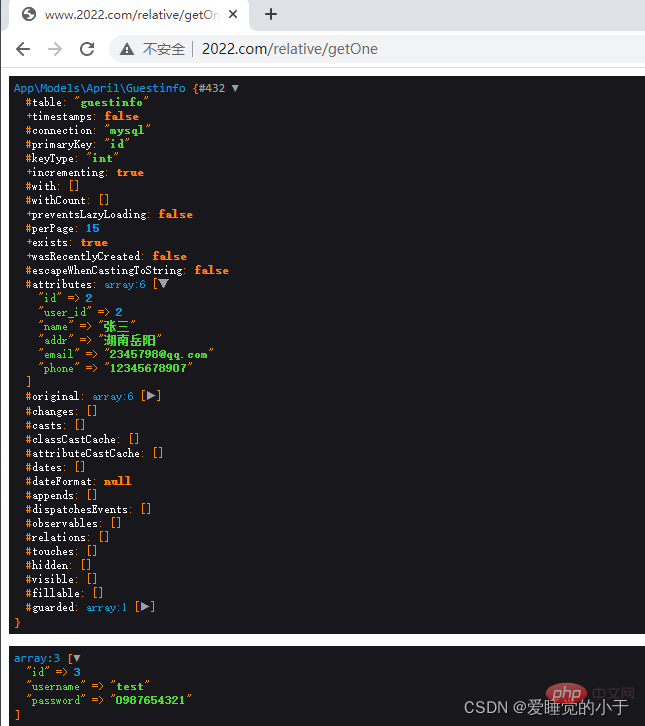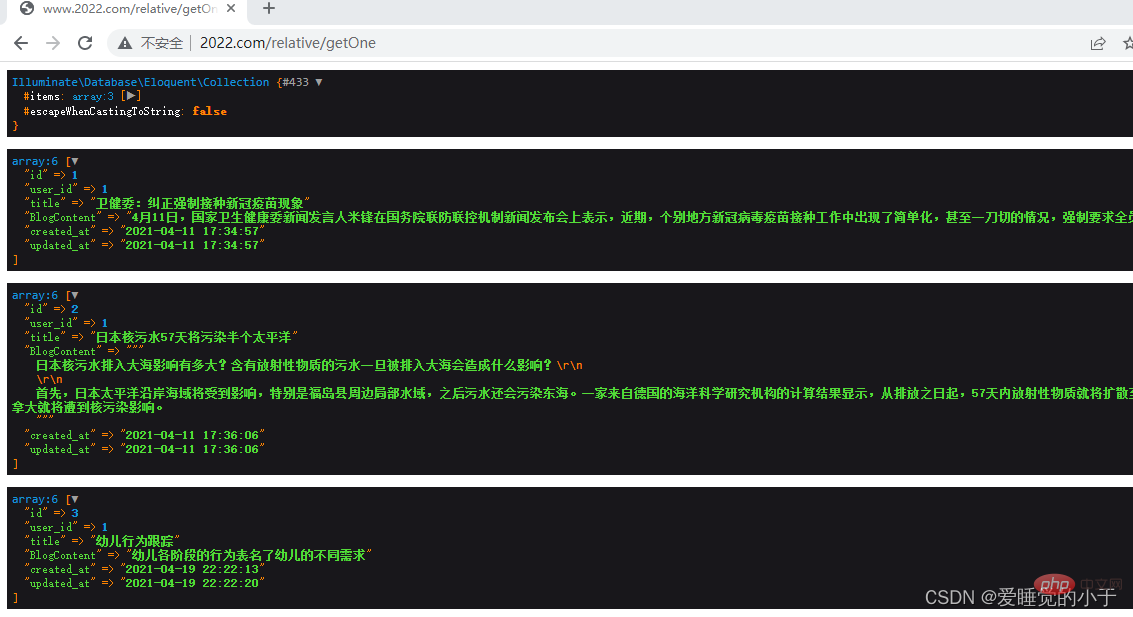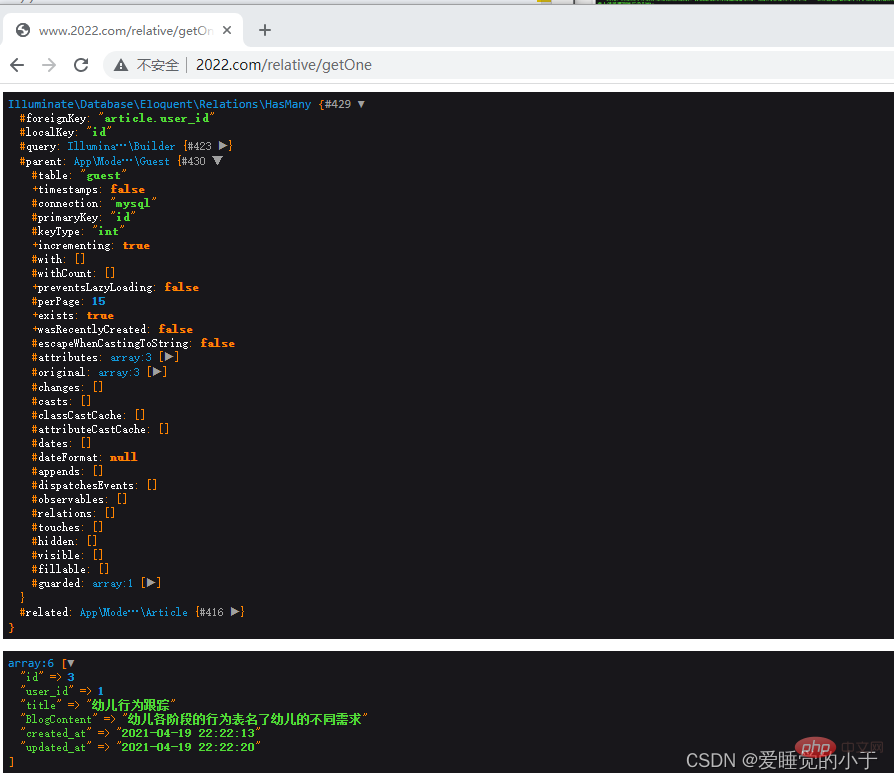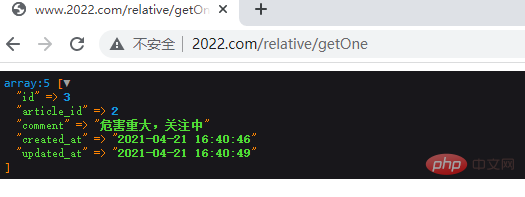Detailed analysis of Laravel Model model association
This article brings you relevant knowledge about laravel, which mainly introduces related issues about Model model association, including one-to-one, one-to-many, many-to-many, etc. , let’s take a look at it, I hope it will be helpful to everyone.

[Related recommendations: laravel video tutorial]
Define association relationships
Database tables are usually related to each other.
For example, a blog post may have many comments, or an order may correspond to one ordering user. Eloquent makes the management and use of these associations simple, and supports multiple types of associations: the first three are the most common, and here we only explain the first three associations
- One-to-one
- One-to-many
- Many-to-many
- Remote one-to-many
- Remote one-to-one
- One-to-one (polymorphic association )
- One-to-many (polymorphic association)
- Many-to-many
Establish model association
One-to-one
Example:
Two data tables: guest User table and guestinfoUser information
where guest The primary key id field in the table corresponds to the foreign key user_id field First create two model files:
php artisan make:model Guestphp artisan make:model Guestinfo Guest model file:
class Guest extends Model{
use HasFactory;
// 设置Guest模型对应的数据表
protected $table = 'guest';
// 关闭create_time和update_time字段自动管理
public $timestamps = false;
// 设置与guestinfo的关联方法,方法名建议使用被关联表的名字
public function guestinfo(){
// hasOne(被关联的名命空间,关联外键,关联的主键)
return $this->hasOne('App\Models\Guestinfo','user_id','id');
}}Guestinfo model file:
class Guestinfo extends Model{
use HasFactory;
// 设置Guest模型对应的数据表
protected $table = 'guestinfo';
// 关闭create_time和update_time字段自动管理
public $timestamps = false;
// 设置与guestinfo的关联方法,方法名建议使用被关联表的名字
public function guest(){
// hasOne(被关联的名命空间,关联外键,关联的主键)
return $this->belongsTo('App\Models\Guest','user_id','id');
}}Create a controller to connect the two model files:
php artisan make:controller Controllers Content:
class Controllers extends Controller{
//
public function getOne(){
// 通过关联方法获取guest表中username = admin记录在guestinfo对应的记录
// ->guestinfo 是Guest模型文件里面定义的guestinfo方法
$guestInfo = Guest::firstWhere('username','admin')->guestinfo;
// 通过关联方法获取guestinfo中id=3 记录在guest表中的对应记录
$data = Guestinfo::find(3)->guest;
dump($guestInfo);
// 将模型转换成数组
dump($data->toArray());
}}Create the route of the controller:
Route::get('relative/getOne',[Controllers::class,'getOne']); Access route: The result is: 
Example:
Two data tables: guest
User table and article Article table where the primary key id
field in the guest table corresponds to the foreign key user_id field created in guestinfo article
model file: php artisan make:model Article<div class="code" style="position:relative; padding:0px; margin:0px;"><pre class="brush:php;toolbar:false">class Article extends Model{
use HasFactory;
// 设置Guest模型对应的数据表
protected $table = 'article';
// 关闭create_time和update_time字段自动管理
public $timestamps = false;
public function guest(){
// 设置与guest的关联方法,与一对一的从表设置一样
return $this->belongsTo('App\Models\April\Guest','user_id','id');
}}</pre><div class="contentsignin">Copy after login</div></div>Add an
Guest model file ## Method
class Guest extends Model{
use HasFactory;
// 设置Guest模型对应的数据表
protected $table = 'guest';
// 关闭create_time和update_time字段自动管理
public $timestamps = false;
// 设置与guestinfo的关联方法,方法名建议使用被关联表的名字
public function guestinfo(){
// hasOne(被关联的名命空间,关联外键,关联的主键)
return $this->hasOne('App\Models\Guestinfo','user_id','id');
}
// 设置与article的关联:hasmany 有很多
public function article(){
return $this->hasMany('App\Models\April\Article','user_id','id');
}} Test it in the Controllers controller file: Example 1: Query all articles published by a user: <div class="code" style="position:relative; padding:0px; margin:0px;"><pre class="brush:php;toolbar:false"> // 查询某个用户发表的所有文章
$article = Guest::find(1)->article;
// 返回为数据集,需要遍历
foreach ($article as $v){
dump($v->toArray());
}</pre><div class="contentsignin">Copy after login</div></div>
Example 2: Query the latest article published by a user
// 查询某个用户最新发表的一篇文章
// article()生成一个构造器,可以进行筛选
$article = Guest::find(1)->article()->orderby('created_at','desc')->first();
dump($article->toArray());// 通过article和guest关联,再通过guest关联的guestinfo获取姓名 $name = Article::find(2)->guest->guestinfo; dump($name->name);
 Example 4: Query the comment information of an article through association
Example 4: Query the comment information of an article through associationCreate Comment model:
php artisan make:model Comment
Comment model code: <div class="code" style="position:relative; padding:0px; margin:0px;"><pre class="brush:php;toolbar:false">class Comment extends Model{
use HasFactory;
// 设置Comment模型对应的数据表
protected $table = 'comment';
// 关闭create_time和update_time字段自动管理
public $timestamps = false;
// 设置与article的关联方法,方法名建议使用被关联表的名字
public function article(){
return $this->belongsTo('App\Models\April\Article','article_id','id');
}}</pre><div class="contentsignin">Copy after login</div></div>Add method comment in the Article model:
public function comment(){
return $this->hasMany('App\Models\April\Comment','article_id','id');
}$info = Article::find(2)->comment;
foreach ($info as $v){
dump($v->toArray());
}laravel video tutorial 】
】
The above is the detailed content of Detailed analysis of Laravel Model model association. For more information, please follow other related articles on the PHP Chinese website!

Hot AI Tools

Undresser.AI Undress
AI-powered app for creating realistic nude photos

AI Clothes Remover
Online AI tool for removing clothes from photos.

Undress AI Tool
Undress images for free

Clothoff.io
AI clothes remover

Video Face Swap
Swap faces in any video effortlessly with our completely free AI face swap tool!

Hot Article

Hot Tools

Notepad++7.3.1
Easy-to-use and free code editor

SublimeText3 Chinese version
Chinese version, very easy to use

Zend Studio 13.0.1
Powerful PHP integrated development environment

Dreamweaver CS6
Visual web development tools

SublimeText3 Mac version
God-level code editing software (SublimeText3)

Hot Topics
 How to get the return code when email sending fails in Laravel?
Apr 01, 2025 pm 02:45 PM
How to get the return code when email sending fails in Laravel?
Apr 01, 2025 pm 02:45 PM
Method for obtaining the return code when Laravel email sending fails. When using Laravel to develop applications, you often encounter situations where you need to send verification codes. And in reality...
 Laravel Eloquent ORM in Bangla partial model search)
Apr 08, 2025 pm 02:06 PM
Laravel Eloquent ORM in Bangla partial model search)
Apr 08, 2025 pm 02:06 PM
LaravelEloquent Model Retrieval: Easily obtaining database data EloquentORM provides a concise and easy-to-understand way to operate the database. This article will introduce various Eloquent model search techniques in detail to help you obtain data from the database efficiently. 1. Get all records. Use the all() method to get all records in the database table: useApp\Models\Post;$posts=Post::all(); This will return a collection. You can access data using foreach loop or other collection methods: foreach($postsas$post){echo$post->
 Laravel Introduction Example
Apr 18, 2025 pm 12:45 PM
Laravel Introduction Example
Apr 18, 2025 pm 12:45 PM
Laravel is a PHP framework for easy building of web applications. It provides a range of powerful features including: Installation: Install the Laravel CLI globally with Composer and create applications in the project directory. Routing: Define the relationship between the URL and the handler in routes/web.php. View: Create a view in resources/views to render the application's interface. Database Integration: Provides out-of-the-box integration with databases such as MySQL and uses migration to create and modify tables. Model and Controller: The model represents the database entity and the controller processes HTTP requests.
 Laravel's geospatial: Optimization of interactive maps and large amounts of data
Apr 08, 2025 pm 12:24 PM
Laravel's geospatial: Optimization of interactive maps and large amounts of data
Apr 08, 2025 pm 12:24 PM
Efficiently process 7 million records and create interactive maps with geospatial technology. This article explores how to efficiently process over 7 million records using Laravel and MySQL and convert them into interactive map visualizations. Initial challenge project requirements: Extract valuable insights using 7 million records in MySQL database. Many people first consider programming languages, but ignore the database itself: Can it meet the needs? Is data migration or structural adjustment required? Can MySQL withstand such a large data load? Preliminary analysis: Key filters and properties need to be identified. After analysis, it was found that only a few attributes were related to the solution. We verified the feasibility of the filter and set some restrictions to optimize the search. Map search based on city
 Laravel user login function
Apr 18, 2025 pm 12:48 PM
Laravel user login function
Apr 18, 2025 pm 12:48 PM
Laravel provides a comprehensive Auth framework for implementing user login functions, including: Defining user models (Eloquent model), creating login forms (Blade template engine), writing login controllers (inheriting Auth\LoginController), verifying login requests (Auth::attempt) Redirecting after login is successful (redirect) considering security factors: hash passwords, anti-CSRF protection, rate limiting and security headers. In addition, the Auth framework also provides functions such as resetting passwords, registering and verifying emails. For details, please refer to the Laravel documentation: https://laravel.com/doc
 Laravel and the Backend: Powering Web Application Logic
Apr 11, 2025 am 11:29 AM
Laravel and the Backend: Powering Web Application Logic
Apr 11, 2025 am 11:29 AM
How does Laravel play a role in backend logic? It simplifies and enhances backend development through routing systems, EloquentORM, authentication and authorization, event and listeners, and performance optimization. 1. The routing system allows the definition of URL structure and request processing logic. 2.EloquentORM simplifies database interaction. 3. The authentication and authorization system is convenient for user management. 4. The event and listener implement loosely coupled code structure. 5. Performance optimization improves application efficiency through caching and queueing.
 Solve caching issues in Craft CMS: Using wiejeben/craft-laravel-mix plug-in
Apr 18, 2025 am 09:24 AM
Solve caching issues in Craft CMS: Using wiejeben/craft-laravel-mix plug-in
Apr 18, 2025 am 09:24 AM
When developing websites using CraftCMS, you often encounter resource file caching problems, especially when you frequently update CSS and JavaScript files, old versions of files may still be cached by the browser, causing users to not see the latest changes in time. This problem not only affects the user experience, but also increases the difficulty of development and debugging. Recently, I encountered similar troubles in my project, and after some exploration, I found the plugin wiejeben/craft-laravel-mix, which perfectly solved my caching problem.
 Laravel framework installation method
Apr 18, 2025 pm 12:54 PM
Laravel framework installation method
Apr 18, 2025 pm 12:54 PM
Article summary: This article provides detailed step-by-step instructions to guide readers on how to easily install the Laravel framework. Laravel is a powerful PHP framework that speeds up the development process of web applications. This tutorial covers the installation process from system requirements to configuring databases and setting up routing. By following these steps, readers can quickly and efficiently lay a solid foundation for their Laravel project.






